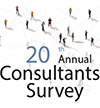Exclusive Research
-
Top States for Business
2023 Top States for Doing Business Meet the Needs of Site Selectors
-
Annual Econdev Awards
19th Annual Area Development Gold and Silver Shovel Awards
-
Corporate Exec Survey Results
38th Annual Corporate Survey: Are Unrealized Predictions of an Economic Slump Leading Small to Mid-Size Companies to Put Off Expansion Plans?
-
Corporate Exec Survey Results
20th Annual Consultants Survey: Clients Prioritize Access to Skilled Labor, Responsive State & Local Government






























